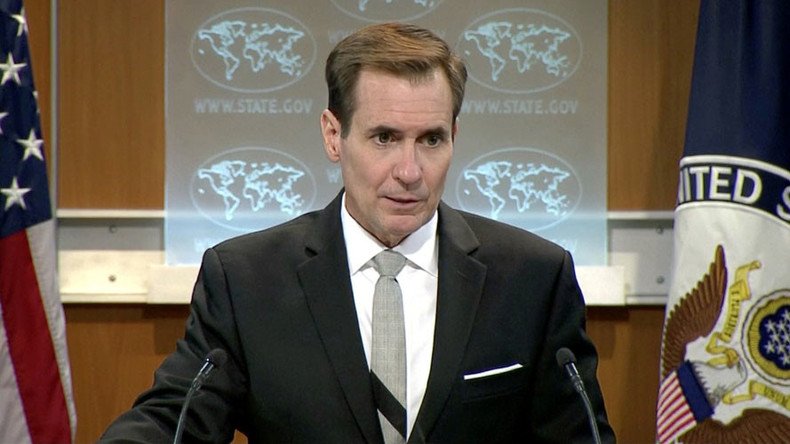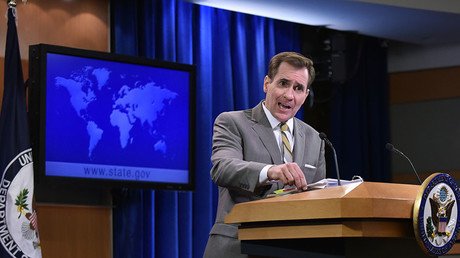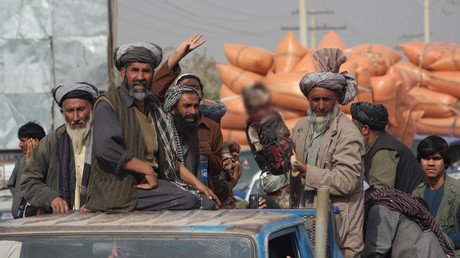'Chilling': US State Dept. brushes off RT over Syrian humanitarian reports

It is very important for RT and others to highlight at every opportunity the appalling brutality that is taking place in Syria as a result of terrorists, Daniel Kawczynski, British Member of Parliament for the Conservative Party, told RT.
During Wednesday’s State Department briefing, spokesman John Kirby accused Russia and the Syrian regime of bombing "five hospitals and at least one mobile clinic in Syria."
An RT reporter asked Kirby, in the spirit of fair reporting and transparency, to specify the details of the alleged incidents, including their location.
Kirby simply reiterated the accusations, adding he will no longer treat RT the same as other media outlets.
RT: The State Department spokesperson accused Russia of airstrikes on a hospital although the World Health Organization report on the incident does not even mention Russia. Why this blame game?
Daniel Kawczynski: Listening to that coverage from the State Dept. official is actually rather quite chilling. My experience of journalists here and professionals at RT in London is that they are a very eclectic mix of journalist professionals, highly skilled and determined to get to the truth. It is very regrettable that John Kirby would use such words to deviate away from answering the question by actually attacking the company itself. I think that there are lessons to be learned over the conduct of that official. Clearly, there are massive polarizing differences of opinion as to how the war in Syria is going, who is responsible and how civilians are being caught up in this appalling and brutal war. And that is why it is very important for companies like RT to have access to be able to challenge officials when they make those sorts of allegations.
RT: Russia’s air force hasn’t conducted a single air strike on Aleppo in the last 30 days. However, rebels affiliated with Al-Qaeda shelling continues unabated, hitting the Western part of the city as well as humanitarian corridors. Why is Syria and Russia taking all the blame for the apparent breakdown of humanitarian efforts?
DK: It is very important for RT and others to highlight more and more at every opportunity the appalling brutality that is taking place in Syria as a result of these terrorists. They are using humans and children as human shields. They know they can’t beat Russian forces and outsiders coming in with superior weaponry, planes and capabilities. So, they are deliberately using and targeting innocent civilians to try to win the media war game which is ensuing. This is obviously extremely dangerous, it is giving a very nuanced and clouded perspective here in the UK and throughout the West, and so I can only reiterate what I said before: It is extremely important that RT and others highlight and demonstrate to my own citizens here in the UK the reality of the situation on the ground because we cannot continue to be fed a very one-sided perspective.
Hiding lack of facts about Russian actions in Syria @StateDept labeled @RT_com, refused to treat its journos in same way as other media's pic.twitter.com/rvKvRPGeYC
— Russia in USA 🇷🇺 (@RusEmbUSA) November 17, 2016
RT: Some in the Western media lay the blame exclusively on the Syrian government and Russia but reports keep coming in of human rights violations committed by US backed-rebels, too. Why is this getting so little attention?
DK: This is why I and a small number of fellow conservative colleagues are absolutely determined to now ramp up the scrutiny and pressure our own government when it comes to the way in which Anglo-Russian relations are conducted. I have used the word in the past – hysteria - and I have been condemned for that. But the anti-Russian hysteria that is pervading through political circles here in London and Washington has quite frankly played a huge role in the increased tension that exists not only in terms of bilateral relations, but in terms of them spilling over into media wars and each side trying to accuse the other of atrocities and inappropriate behavior. We have to go the extra mile to negotiate with the Russians, to get around the table with the Russians, to try to bring this war to an end. The world is watching and is expecting the new president of the US - when he comes into office - to get around the table with President Putin and to try to work constructively together to try to destroy ISIS in Syria. Let’s work collaboratively together. Let’s set aside some of these appalling tensions that have been built up. I don’t think we can see an end to the war in Syria unless the Americans and the Russians start to collaborate more effectively on this.
RT: Just in past 72 hours the president-elect of the US Donald Trump had a phone call with Vladimir Putin and both of them reportedly agreed to further goo after terrorists in Syria. What does that mean? What is the effect that Trump is already having with the anti-Russian hysteria in political circles in the UK?
DK: That is the million-dollar question. That is a fascinating question because of course the UK will have to somehow hopefully recalibrate its own position vis-à-vis Moscow when our most important strategic NATO partners starts to unwind some of the tensions with Moscow itself. It would be rather strange and peculiar situation if NATO as a whole didn’t take some sort of notice or lead from the change in the direction and policy of the US. I and a few others have been calling for a radical reassessment of our relationship with Russia for a long time. And the efficacy of the sanctions that are in place against Russia. This win by Trump is very important and actually I like to say that I know of friends of mine who are Democrats who normally vote Democrat in the US who specifically voted for Trump because they were very worried about the trajectory of confrontation with Russia, which had existed under Obama and which would have been magnified under a president Clinton.
RT: During the US State Department briefing, spokesperson John Kirby said that RT is not on the same level as the other media outlets that were present. This came after an RT correspondent had asked him for evidence concerning alleged hospital strikes. Was Kirby's response appropriate?
Jim Jatras, former US diplomat: It is not appropriate at all. I read the transcript. I thought it was interesting that Kirby faulted RT for being state-supported and then he immediately turned to the BBC. I guess there is very much a double standard on the substance of Aleppo. Here we have a Russian-supported Syrian offensive against Al-Qaeda in Aleppo, which is strikingly similar to what is going on with the US support for the Iraqi offensive against ISIS in Mosul. There are all sorts of understanding in the case of Mosul. You have an offensive against a populated area held by a vicious terrorist group, no understanding of that situation when it comes to Aleppo, just unsupported accusations and not even identifying the sources of accusation. It is hard to believe that this is being done in good faith.
RT: What was it about the questions posed by RT’s correspondent that prompted the spokesperson's reaction?
JJ: I think there are a couple of things. One is I think he knows that the factual basis of these accusations is weak. That is not what is important here for the Obama administration. It is to throw the accusation, stir up a dust cloud because what they really want to do is - and let’s be brutally honest about it - they want to protect Al-Qaeda and the other terrorists in Aleppo. Because it is the only leverage they have on the failed policy. So, they will make accusations of hitting civilians, hospitals, war crimes and so-forth as a diversion. It is really sad to see a US government agency descend to this level.
RT: France's UN ambassador has called the alleged attacks on medical facilities in Syria by the government and its allies war crimes. At the same time, reports say civilians are trying to flee Eastern Aleppo, but rebels there are stopping them. Why has there been no official reaction to that?
JJ: Because it boils down to who essentially is our client here. It is not the Assad government, it is not the Syrian army, it is certainly not Russia. It is these various terrorist groups, either Al-Qaeda or the groups that are allied to Al-Qaeda. Again, those very same tactics are being used against civilians in Mosul. And we do get reports about that in the Western media and in many cases it also happens to be true. But when those things are used by the terrorists in Aleppo against civilians, we want to ignore that because it gets in the way of our narrative of saying that the Russians and the Syrians are responsible for any civilian carnage.
RT: Some in the Western media lay the blame exclusively on the Syrian government and Russia but reports keep coming in of human rights violations committed by US backed-rebels too. Why is this getting so little attention?
JJ: Because long before the Syrian war, [the mainstream media] has essentially mouthpieces for government propaganda and it is a really sad development in what is supposed to be a free and independent media and that is the reason why RT and other non-US based sources are important and frankly what we call ‘alternative media.’ And I think a lot of Americans are basically trying to do what people used to do in the old days of the Soviet Union is weed through the lies of the official media and try to piece together what might really be going on. It’s a shame that we have to descend to that level in this country.
The statements, views and opinions expressed in this column are solely those of the author and do not necessarily represent those of RT.














